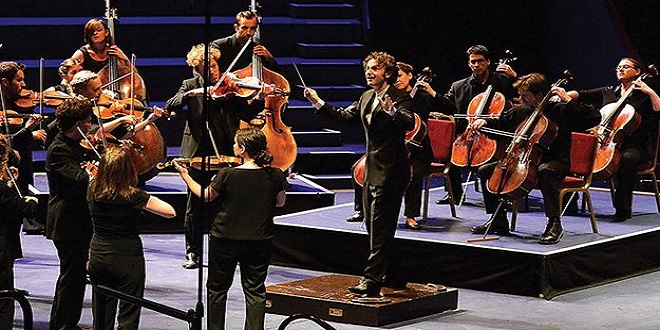Why Orchestras Don’t Remember Their Music

You will see musicians moving around the stage and playing completely from memory at any rock concert. They don’t have music stands to hold printed music. You will find the exact opposite at a symphony orchestra performance. Why is this? But why is it that rockers can remember the music while orchestra members don’t?
It’s actually much simpler than it seems. This is not because classically-trained musicians are lazy. Their music isn’t too difficult to remember. This is due to the fact that many symphony orchestras perform hundreds of pieces each year. A typical rock band will put together a few dozen songs and play them over the course of a year.
A Matter Of Volume
Stephen Johnson, BBC Music Magazine’s Stephen Johnson, says that seeing an orchestra play from memory is not something we are used to seeing. These orchestras are rare and far between. This is true both historically and today. Orchestras have always had sheet music to view.
It really is a matter volume. The majority of classical pieces are already sufficiently complex. A piece of seven to eight pages in length is a lot of notes. Imagine playing in a local symphony with ten programs each season. You could end up with a hundred pieces if each program demands ten. This is a lot to remember.
Studio musicians don’t often remember their music. New York-based Supreme Tracks claims that its orchestral pieces are created on a one-off basis. It’s impossible for musicians to remember studio music due to the volume and speed at which it has to be recorded.
Conductors and Arrangements
The conductor is another thing you should consider. Conductors may have different interpretations of the pieces. An orchestra might have to perform the same piece five times to please five guest conductors. This does not include arrangements. Even the most well-known pieces are tailored to suit conductors. A musician can be confused by the smallest details of a new arrangement if they have previously learned a piece in a different way.
It is strange that only a few classical musicians actually remember the music. Soloists, for example, tend to remember the music. Vocalists and pianists are also susceptible to this. It’s not known why. They are proof that classical music can be learned. For a local symphony, which rehearses and performs so many pieces, it’s not feasible.
What are the Benefits of Memorizing?
Even though many orchestras don’t know the music well, there are still benefits. One of those benefits is the opportunity to interact more with the audience. You won’t be glued to a piece on paper if you are familiar with your music. You can look at the audience. You can learn from their reactions and responses.
You also have more freedom of movement. Orchestras don’t necessarily need this, but having a music stand right in front of you allows you to move freely. Imagine the Rolling Stones playing with music in front of their faces. Mick Jagger’s famed stage struts wouldn’t happen. health
Although the local orchestra might be able to memorize their music, and some do, it is difficult because of the sheer volume of music.



